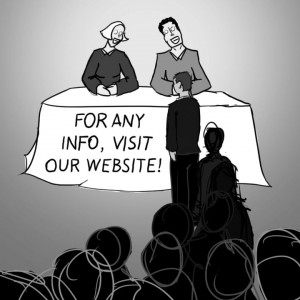Career fair overlooks liberal arts
What are you going to do after college? For many of us, this is the most anxiety-inducing question we could ever be asked by our peers, professors, advisers and, worst of all, our parents. We have all heard stories about friends or roommates or siblings moving back in with Mom and Dad and settling for a job at the local fast food joint to pay off their student loans after graduation. No one wants to be that student.
This is why the USC Career Center organizes and hosts a large variety of career events on campus, the largest being the career fairs. USC is an institution with an outstanding number of schools and programs of study. Students — especially juniors, seniors and graduate students — need to know that there are job opportunities awaiting them after college that fit their individual interests.
The Career Center hosts two large career fairs on campus each year: one during the fall semester and one during the spring semester. Invitations to participate in the career fairs are sent out to company representatives who have posted job openings on ConnectSC, USC’s career database. According to Carl Martellino, the executive director at the Career Center, 12,000–14,000 employers have posted job openings on ConnectSC in the past year. Of those employers, 170 came to the Fall 2011 career fair; 180 employers came to the spring 2012 career fair that took place on Feb. 9, making it “one of the largest career fairs at USC,” Martellino said.
As an undergraduate job seeker at the Spring 2012 Career Fair, I learned, however, that the fair is not always, well, fair.
The most recent campus career fair did not provide equal opportunities for students from all major fields of study. Most of the available job opportunities were in business, marketing, accounting and other finance-related fields.
Of course, students from the Marshall School of Business probably saw the event as a gold mine. But where did that leave the students from the other schools on campus? Martellino explained that many schools, such as the Viterbi School of Engineering and the Annenberg School for Communication and Journalism, hold their own separate career events for students in those fields.
What is truly perplexing, however, is that the Dornsife College of Letters, Arts and Sciences — the school with the longest list of majors — does not have its own career fair.
There are workshops and special panels for students belonging to this school, but there is no fair. Dornsife students depend entirely on events organized by the Career Center.
Martellino said that liberal arts students have the most flexibility at the career fairs.
“If you’re an English major, you may not plan on being an English teacher,” Martellino said. “You may decide you’re going to go into marketing, or some business area, or go on to law school.”
Martellino makes a valid point. Some students do wish to branch out from their major and pursue careers that differ from what they’ve been studying in school.
There are still many students, however, who want jobs that are specific to their major. They didn’t spend the last few years of their lives studying apples because they’re interested in working with oranges.
In addition to the trend of business employers, it was also apparent that the employers at the career fair preferred graduating seniors and graduate students.
But what about the rest of us? In the words of several employers I spoke to, including the U.S. Drug Enforcement Administration and the Los Angeles County Department of Mental Health: “Come talk to us next year.”
There were also a number of companies at the career fair that were based in regions outside of California.
For example, the Urban Teacher Center only had positions in Baltimore and Washington, D.C. Such distant positions require thousands of miles of traveling, room and board and an array of miscellaneous living expenses.
This might not be an issue for some students, but if I could afford an out-of-state adventure, I wouldn’t have been at the career fair.
Perhaps all major departments should organize small career fairs so that all students are accommodated. They should invite more representatives from local organizations that are willing to consider students at multiple points in their college careers.
We’re in Los Angeles, one of the largest cities in the country. The job opportunities are here. Lead the way, USC.
Jennica Johnson is a junior majoring in psychology.


WHAT?!?! There are not a lot of of jobs for liberal arts majors out there?? I am for one shocked!!! ….
The reason companies ask for you to come back in a year is they are there to hire full time employees, namely graduating seniors who are about to become available to work. Why would a company hire someone for a job when they couldn’t actually work?
The example company recruiting for positions in cities out of state is also another /facepalm. Is it really a surprise if you accept a job offer in a city out of state that it will require you to travel there, rent an apartment/house, and pay for living expenses? That is part of moving…somewhere else!
Can’t tell if continuation from sarcasm article, or if trying to prove futile point?